Tehran Denies US, UN Claims Placing Al Qaeda's Leader In Iran
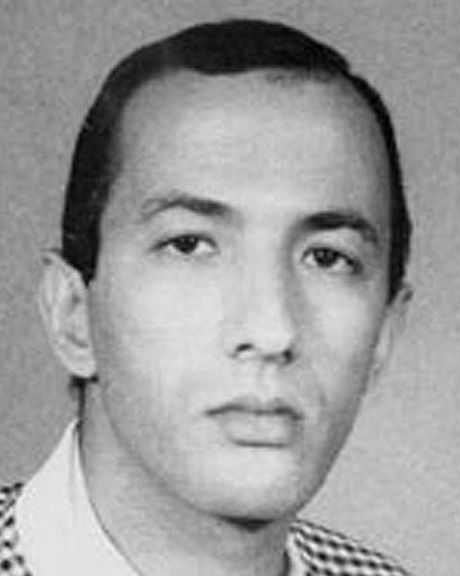
Iran denied US claims that Al Qaeda's leader Seif al-Adel is based in the country, foreign minister Hossein Amir-Abdollahian wrote on Twitter on Thursday.

Iran denied US claims that Al Qaeda's leader Seif al-Adel is based in the country, foreign minister Hossein Amir-Abdollahian wrote on Twitter on Thursday.
Washington on Wednesday aligned itself with a UN statement placing Adel in Iran.
"I advise the officials of the White House to stop the failed game of Iran-phobia, making news about the leader of Al-Qaeda and linking him to Iran is laughable," Amir-Abdollahian wrote.
Seif al-Adel, a former Egyptian special forces officer who is a high-ranking member of al Qaeda with a $10 million US bounty on his head, is now the "uncontested" leader of the militant group, according to a new U.N. report on the organization.
The US State Department said Wednesday it aligned with UN assessments that Seif al-Adel is based in Iran.
Adel was indicted and charged in November 1998 by a US federal grand jury for his role in the bomb attacks on the US embassies in Tanzania and Kenya that killed 224 civilians and wounded more than 5,000 others.
Following the African bombings, the former Egyptian army lieutenant colonel moved to southeastern Iran, where he lived under the protection of the country's Islamic Revolutionary Guard Corp, according to the US State Department's Rewards for Justice program.
He and other Al Qaeda leaders were placed under house arrest in April 2003 by Iran, which released him and four others in exchange for an Iranian diplomat who was kidnapped in Yemen.
Report by Reuters
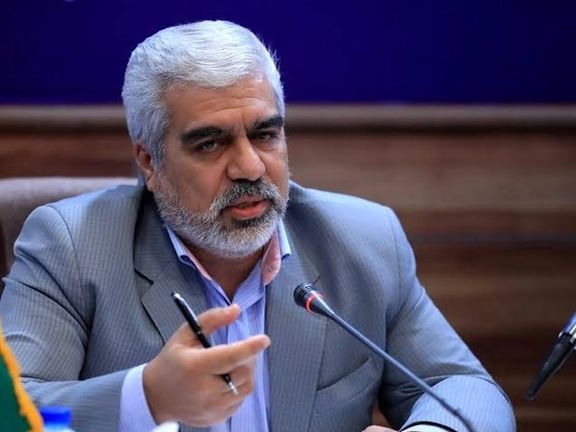
The journalists who reported a case of sexual abuse of several minors at a football school in northeastern Iran have been banned from work for six months.
The chief prosecutor of Iran's Khorasan Razavi province, Mohammad-Hossein Doroudi, still refrains from naming the club but according to reports the scandal took place at a sports school in the religious city of Mashhad called “Namazgozaran,” literally meaning the ones who pray. The number of arrested whistleblowers is more than the suspects in the case. He did not mention whether or when a court session took place for the case.
The two journalists who broke the news were banned from work for six months, which is exactly the sentence given to the coach, who is accused by the families of the boys of sexually abusing their children and – according to unconfirmed reports – filming them. Another journalist and an official of the city’s Sports and Youth Organization were also given sentences over the case.
The prosecutor has not elaborated on the case and the sentences, as is the norm in the Islamic Republic when the scandal is very big or when the accused are connected to high-ranking officials.
The prosecutor, who had earlier warned the families not to speak to the media, said, "According to the investigation, no document and proof of physical assault by the coach at this football school has been presented to the judicial system and nothing has been proven." But he did not explain why the caich was suspended for six months.
In January, Sports Minister Hamid Sadjadi said he had ordered an investigation following reports of sexual abuse. According to the Iranian official news agency, IRNA, a former media manager for the Shahr Khodro football team said on social media in January that the parents of 15 trainees from had filed a complaint against the club and coaches for sexual assault on their children.
The incident made it to the media when Shahrara daily, which is affiliated to Mashhad municipality, reported that “families of the children had gathered in front of the headquarters of the provincial football organization to protest this tragedy.” Since there was no follow-up by the authorities, the families were forced to publicize the case through the media, the daily added.
During a press conference late in January, Judiciary Spokesman Masoud Setayeshi, who was asked about the case, said, "We are investigating what is the motive for publishing such news."
Sexual abuse has made football schools a serious threat for children and teenagers. Reports say even some mothers of the children receive sexual offers from the coaches and officials of these schools.
Reza Torabian, a former football player, had earlier said that “Some officials of football schools ask the single moms to have sex in return for letting their kids play in famous teams.”
Sexual abuse of minors in football schools and other institutions is usually not reported by officials, but in the last two decades, Iranian media have published numerous reports of such cases.
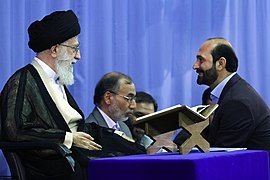
One of the cases that was internationally covered was the case of Supreme Leader’s "favorite Quran reciter" Saeed Toosi, who was accused of "sexually abusing underage trainees." In October 2016, reports revealed that Toosi sexually abused 19 of his prepubescent Quran students over the past years.
The Islamic Republic authorities usually prefer to detain journalists who spill the beans in scandalous cases, as they did in the case of Mahsa Amini’s death in hijab police custody, an event that triggered the ongoing antiregime protests. The current wave of rallies has been described as the boldest challenge against the clerical regime so far. In a new book, two Iranian academics argue that Iranians have lost trust in the regime, which is perceived as inefficient and mired in discriminatory behavior.

Canadian Journalists for Free Expression (CJFE) has presented its award to Niloufar Hamedi and Elahe Mohammadi, who have been imprisoned for five months, after publishing reports about the killing of Mahsa Amini in Iran.
The ceremony was held on Wednesday in Toronto, and Margaret Atwood, a Canadian writer and poet, presented the International Press Freedom Award to these two journalists in absentia.
Canadian Journalists for Free Expression supports those who show courage in seeking and reporting the truth.
For more than 40 years, the CJFE has championed free media and the role it plays in creating a just and equitable society. The organization supports and upholds the rights of all global citizens to hold leaders to account, to ask hard questions, and to use their voices to speak the truth.
Shahram Rafizadeh, an Iranian journalist, received the award on behalf of the two journalists symbolically.
While Hamedi and Mohammadi are imprisoned for first publishing reports about the death and funeral of Mahsa Amini, Iran’s Foreign Minister Hossein Amir-Abdollahian recently claimed in an interview with America’s National Public Radio that no journalist was arrested during Iran protests.
According to the latest reports by the Iranian Journalists Association, several reporters who were arrested at the beginning of the protests, are still in prison. In total, nearly 70 journalists were arrested.
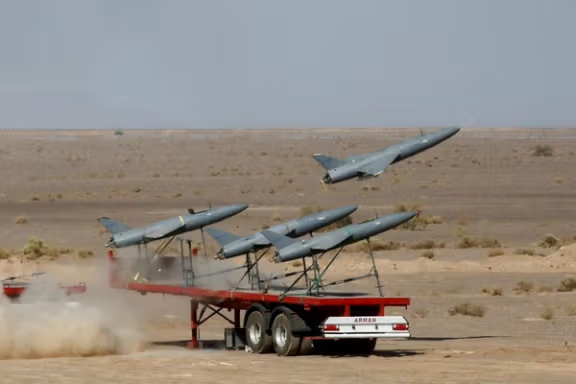
Axios has revealed more details about the European Union’s plan to impose sanctions on Iran’s Revolutionary Guard over drones supplied to Russia.
Axios quoted two EU officials on Wednesday as saying that the European Union is expected to impose sanctions on seven entities connected to the IRGC that the bloc believes are involved in the delivery of drones to Russia for its war against Ukraine.
According to the report, one senior EU official stated the bloc is "much more concerned" about Tehran’s weapons support for Moscow than it was before.
"The IRGC is much more the focus than it used to be, and there is a real change of mindset."
The sources also noted that the package of sanctions was formally presented on Wednesday in a meeting of the European Commission.
“The package includes sanctions against the IRGC Aerospace Force, which the bloc says is involved in the delivery of drones to Russia and the training of Russian operators, and the IRGC Research and Self-Sufficiency Jihad Organization,” revealed Axios.
The package also includes sanctions against the Russian company Concern Morinformsystem–Agat, the officials said.
Iran has been supplying Shahed kamikaze drones to Russia since mid-2022 that have been used in large numbers against Ukrainian infrastructure targets.
Iran initially denied supplying drones to Russia, but as physical evidence of their use in Ukraine built up foreign minister Hossein Amir-Abdollahian admitted the transfer, claiming that drones were sent before the Ukraine war.
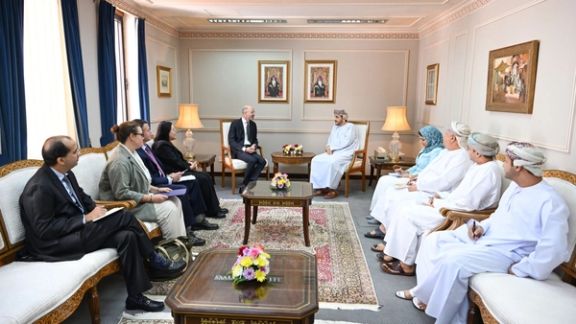
US Special Envoy for Iran Robert Malley held talks with Omani officials about Iran, as reports emerged of indirect talks to free US prisoners held in Tehran.
Malley tweeted a photo of his meeting with Sheikh Khalifa Al Harthy, Foreign Ministry Undersecretary for Diplomatic Affairs, on Wednesday, saying they discussed deepening their close partnership on a range of issues related to Iran. “I also reiterated our thanks to Oman for their help securing Baquer Namazi’s release,” Malley added.
Namazi was held hostage in Iran for more than six years and was released in October.
Later in the day, US State Department spokesman Ned Price said, “Oman has played a constructive role across the Middle East... in the region in the past. It has been a bridge-builder between countries that do not always see eye-to-eye. Rob (Malley) tweeted this morning that he had a very good set of meetings in Oman. They discussed a number of issues related to Iran.”
NBC had reported earlier that $7 billion of Iran’s funds held in South Korea will be released as part of a prisoner deal.
Iran International’s correspondent asked Price if the US is willing to give the Iranian people assurances that any released funds are not going to end up in IRGC’s hands. Price responded that he is not in a position to confirm or deny any reports.
“We engage with our partners around the world to thank them for upholding the sanctions regime that is in place and will be in place until and unless Iran addresses the challenge that its nuclear program poses to the United States; poses to our allies and partners and poses to the broader region,” he added.
Circumventing a direct answer about contacts to resume the talks aimed at reviving the JCPOA, he said that “even when relations are at a low we are able to pursue our interests and to pursue them effectively in the midst of Russia's brutal war against Ukraine despite everything that we're doing to support our Ukrainian partners and everything we impose on Russia as a result of its brutal aggression we've been able to bring home we've been able to bring home Brittney Griner.”
He added that bringing Americans home will always be profoundly in our interests and even when relations are at a low or maybe close to that point, we are determined to do everything we can to secure the safety and the well-being of our citizens.”
Praising the “instrumental role Oman has played to solve challenges helping to bridge divides,” he said that Oman “did play a very useful and important role in the decision on the part of the Iranian regime’s release of Baquer Namazi.”
“They were very supportive as part of our long-standing persistent efforts to see all of our wrongful detainees... to help effectuate them release from the Iranian custody.”
“So, we thank Oman for the role it has played, and we continue to consult closely with Oman on Challenges near and far and Rob’s engagement was part of that.”
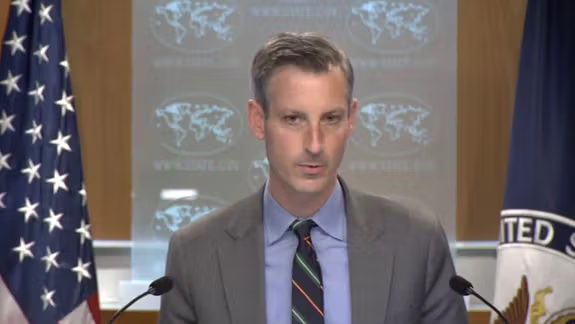
Seif al-Adel, the apparent new leader of al Qaeda is in Iran, a United Nations report has said and the United States confirmed the information on Wednesday.
State Department spokesperson Ned Price was asked during his daily press briefing to comment on the UN report. He said: “Our assessment aligns with that of the UN…offering safe haven to al Qaeda is another example of Iran’s wide-ranging support for terrorism, its destabilizing activities in the Middle East and beyond.”
Asked by a reporter what the United States is ready to do if Adel is in Iran, Price said that the Biden administration is determined not to allow threats to emerge. “We have taken action against Iran for its support for terrorist group throughout the region,” he said and added that Washington will closely coordinate with European allies to confront “all the challenges Iran poses.”
Seif al-Adel, a former Egyptian special forces officer who is a high-ranking member of al Qaeda with a $10 million US bounty on his head, is now the "uncontested" leader of the militant group, according to a new U.N. report on the organization.
Al Qaeda has not formally named a successor for Ayman al-Zawahiri, who was believed to have been killed in a US missile strike in Kabul last year, dealing a blow to the organization since its founder Osama bin Laden was killed in 2011.
Although a US intelligence official said in January that Zawahiri's succession remained unclear, the United Nations report assessing risks from the group said: "In discussions in November and December, many Member States took the view that Seif al-Adel is already operating as the de facto and uncontested leader of the group."
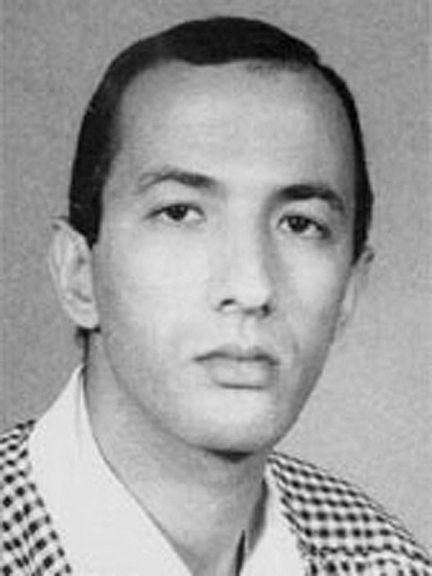
Unlike his slain predecessors who maintained a high profile with fiery videos broadcast around the globe threatening the United States, the experts say Adel planned attacks from the shadows as he helped turn al Qaeda into the world's deadliest militant group.
Adel was indicted and charged in November 1998 by a U.S. federal grand jury for his role in the bomb attacks on the US embassies in Tanzania and Kenya that killed 224 civilians and wounded more than 5,000 others.
The US State Department had already said that Adel was based in Iran. The department’s Rewards for Justice program is offering up to $10 million for information on Adel, whom it says is a member of "al Qaeda’s leadership council” and heads the organization’s military committee.
The program’s website says that after the Africa bombings, the former Egyptian army lieutenant colonel moved to southeastern Iran, where he lived under the protection of the country's Islamic Revolutionary Guard Corps.
He and other Al Qaeda leaders were placed under house arrest in April 2003 by Iran, which released him and four others in exchange for an Iranian diplomat who was kidnapped in Yemen.
Once Osama bin Laden's chief bodyguard and a senior trainer of militants, experts on the jihadi movement say Adel began his long bloody career in 1981, when he was suspected of involvement in the assassination by Islamist soldiers of Egyptian President Anwar al-Sadat during a military parade in Cairo that was broadcast on television.
One of al Qaeda's leading military chiefs and often called by experts its third-ranking official, Adel set up training camps for the organization in Sudan, Pakistan and Afghanistan in the 1990s.
He also played a role in the ambush of US helicopters in Mogadishu, known as the "Black Hawk Down" incident in 1993 which killed 18 US servicemen, security experts say. That marked the beginning of the eventual withdrawal of a US-UN peacekeeping force from Somalia.
The FBI identifies Adel as one of its most wanted terrorists and accuses him of conspiring to kill US nationals, to murder and destroy buildings of the United States.
"He (Adel) is a very bold, professional, cold-blooded figure," said Yoram Schweitzer, head of the Program on Terrorism and Low-Intensity Conflict at Tel Aviv University’s Institute for National Security Studies.
With reporting by Reuters